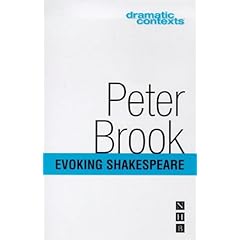
Each line in Shakespeare is an atom. The energy that can be released is infinite – if we can split it open.
(pg 25, Evoking Shakespeare: Peter Brook)
This is quite a short work – the transcript of a talk given in
I must admit, when it arrived, I got into a bit of a huff: Six Pounds Sterling (and postage on top of that) for such a short work was a little expensive.
(The publisher has obviously realized this – and added on to the end nine more pages of text from what I assume is either another talk or possibly a magazine article on ‘Forgetting Shakespeare’. I’ll post separately on that as, although there is a Shakespeare connection, I think there is a fundamental difference between the two and both benefit from the separation.)
However, it didn’t take me long to realize, rather than merely spending a pot of tarnishable silver, I had bought pure gold.
In essence, Peter Brook gives a short answer to a deep question –
‘Why isn’t Shakespeare out of date?’
Key to appreciating the richness and longevity of Shakespeare's texts is an understanding of the innate abilities behind their creation. A phenomenal memory can be counted as ‘top of the list’ of these abilities.
It was a memory for language, for nuances, for ‘feeling’.
I am reminded of Mozart on this point – who was able to listen to the setting of the Miserere by Allegri in one sitting and write it out: Whether such an ability is ‘savant’ or trained is irrelevant – it is the possession of such an aptitude that has enabled both of these ‘geniuses’ to go on and use what they remember.
Shakespeare was able to observe, to assimilate and to remember (in what Brook calls the ‘Shakespeare Brain’) the live, thriving, international wonder that was Elizabethan and Jacobean London.
But this, on its own, is not enough – we have to add a second inheritance – the capabilities of a ‘poet’.
Brook describes this as the facility to see connections where we do not normally see them; to choose words which don’t just ‘define’ but which resonate. It is an ability to be human – with a difference.
Imagery is used by a poet in such a way as to go beyond ‘concept’; there is ‘music’ in the arrangement of words – not the crass music of the drama student beating out the ten beats of the pentameter and going no further, but the subtle music of the spheres Shakespeare and his ilk are able to suggest by the apparently simplest arrangement of words.
Brook assumes Shakespeare wrote fast and started with a story. But Shakespeare was not writing journalism, and he was not writing for the print media – he had a stage, a specific space to write for – and to use.
Like the Globe, the Swan, the Rose, there are levels in the texts which originate in the physical arrangement of the acting area. This was a totally new space – nothing had ever existed quite like it before, and Shakespeare and his contemporaries had to invent a new ‘theatrical’ language to exploit the resources. Theatres were places of intensity – places of concentration, places which showed the truth that lay behind the ‘sense’.
Orson Welles was faced with a similar challenge and reacted with similar excitement and creativity when he made Citizen Kane.
Perverse, then, the difficulties thrown up around modern productions of Shakespeare. Now the language, after the academics have had their hands on it, seems artificial and unusual – and this is not a product of the aging of the words, it is deliberate ‘strange-making’ in search of genius – Shakespeare is the unique genius therefore he must do difficult amazing things.
If the works have survived despite this (and not because) they have done so because of they reveal. That revelation comes in performances of the works which communicate with ordinary people. What must a production do in order to communicate, what must the language of Shakespeare appear to the audience?
Brook makes the point very clearly:
Shakespeare must seem natural!
This is a great lecture – there are questions and answers tagged on which explore some of the ideas Brook touched on (I especially like the extension on the nature being nurtured) and some, like the problem of working with Shakespeare in French, not.


No comments:
Post a Comment